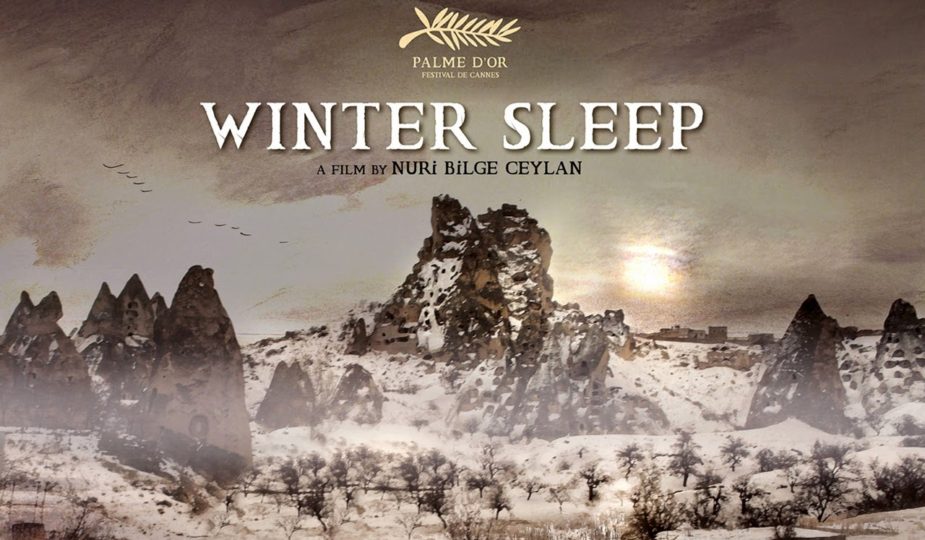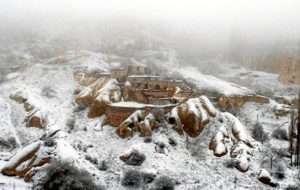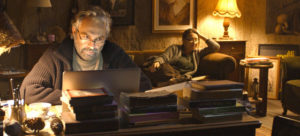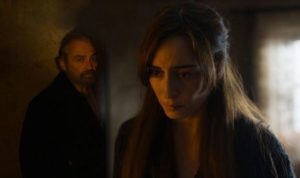
Winter Sleep (2014)
Director: Nuri Bilge Ceylan
“Not seeing a man for what he is, idolizing him like a god, and then being mad at him, because he’s not a god. Do you think that’s fair?”
Inspired by three short stories by Anton Chekhov and some of Dostoevsky’s writings, Winter Sleep is the most ambitious film by the Turkish director Nuri Bilge Ceylan, and won him the Palme d’Or in 2014. Ceylan is an exceptional photographer who has become a major filmmaker and established himself as one of the greatest names in contemporary cinema, and Winter Sleep is the culmination of a process of maturity and refinement of style that was already noticeable in its predecessor, the magnificent Once Upon a Time in Anatolia (2011).
In Winter Sleep, the premise is direct: in its 3 hours, 16 minute duration, Ceylan wants to transmit the power of a prodigious visual novel. The auteur’s beautiful images blend with the depth and complexity of his dialogues, co-written by his wife, Ebru Ceylan. The result is an intriguingly reflective work and interior study, which unfolds with every viewing that adds to the celebration of the film’s artistic dimension. “I try to understand the human soul,” Ceylan tells us in an interview about this film. The Turkish filmmaker moves through an insightful exploration of people’s actions and desires. He creates a remarkable statement on how our experiences and our past shape and limit us. Like a Shakespearean play, these questions are explored under the gazes of his characters.
 The stunning landscape of the film is set in Cappadocia, an ancient mountainous area in Central Anatolia. The strange beauty of that peculiar geographical corner offers the first deep impact to the viewer. We are introduced to the lives of Aydin (Haluk Bilginer), owner of a boutique hotel where he lives with his beautiful young wife, Nihal (Melisa Sözen), and his recently divorced sister, Necla (Demet Akbag). Aydin is a retired actor and owner of several properties in the region, all inherited from his father.
The stunning landscape of the film is set in Cappadocia, an ancient mountainous area in Central Anatolia. The strange beauty of that peculiar geographical corner offers the first deep impact to the viewer. We are introduced to the lives of Aydin (Haluk Bilginer), owner of a boutique hotel where he lives with his beautiful young wife, Nihal (Melisa Sözen), and his recently divorced sister, Necla (Demet Akbag). Aydin is a retired actor and owner of several properties in the region, all inherited from his father.
There is an abysmal disconnection between the way Aydin sees himself -compassionate, superior, intelligent, brave- and how he is seen by the others. Aydin spends his time writing essays for the local newspaper. He speaks through his own life and experiences, but also with his ideas. Our protagonist is an idealist rather than a realist, he always puts words before actions. His sister, unable to deal with her own problems, confronts him by  questioning the arrogant paternalism with which he writes his weekly newspaper column. Aydin’s wife Nihal feels suffocated and annoyed by the narcissistic behavior that he displays every day, and is portrayed as an antidote to his loneliness. In a way, Aydin carries out what most men have deep within: the pure need to satisfy loneliness, the coldness of narcissism, and the deep nostalgia of a past that is no longer there.
questioning the arrogant paternalism with which he writes his weekly newspaper column. Aydin’s wife Nihal feels suffocated and annoyed by the narcissistic behavior that he displays every day, and is portrayed as an antidote to his loneliness. In a way, Aydin carries out what most men have deep within: the pure need to satisfy loneliness, the coldness of narcissism, and the deep nostalgia of a past that is no longer there.
The lives of Aydin and Nihal are carefully dissected, with calm and measure, gradually revealing the implicit keys that open the intimate secrets of their relationship. They both fight out a silent duel between conscience and pride. The double entendres in their conversations alternate with reciprocal humiliation, and cynicism leaves no room for forgiveness. The surface is beautiful, but the underground is rotten.
Aydin, his wife and his sister can see the world’s problems, and they apparently have many ideas and opinions on how to solve them. But they look the other way when trouble hits them; keeping silent, distorting or recreating reality at their will and according to their own wishes. Ceylan spins around these characters and portrays a prodigious study about class division, pride, misanthropy, resentment, loneliness, nostalgia, love, guilt and intellectual narcissism.
There is always misunderstanding and excessive prejudices between the  characters, they talk a lot but can’t communicate. The grandiloquence and elevated insights of Aydin aren’t enough to unfold the hearts of his family. The coldness of the stone landscape around them is nothing less than the reflection of dry souls. The winter turns into a nightmare for these prisoners in Cappadocia. Refugees in their self-imposed victimization, they are lost in daily boredom and monotony.
characters, they talk a lot but can’t communicate. The grandiloquence and elevated insights of Aydin aren’t enough to unfold the hearts of his family. The coldness of the stone landscape around them is nothing less than the reflection of dry souls. The winter turns into a nightmare for these prisoners in Cappadocia. Refugees in their self-imposed victimization, they are lost in daily boredom and monotony.
The images transmit the roughness of the rocks, the sound and feel of the wind, the comfort of a heated room in the middle of winter. This precision of the environment and amplification of its ambient sounds turns the scenes into vivid places and contributes to let oneself be carried away by emotions and inevitable thoughts about one’s own existence. In Chekhov’s words: “All of life and human relations have become so incomprehensibly complex that, when you think about it, it becomes terrifying and your heart stands still.”
by Octavio Carbajal González
Read all stories in our special about Nuri Bilge Ceylan and his films:
Once Upon A Time In Anatolia (2011)
Winter Sleep (2014)
The Wild Pear Tree (2018)
Nuri Bilge Ceylan On His Beginnings And Art- An Interview

Hi, Octavio.
I promised you in Instagram. I have just watched that great movie and read your review. Both of them are so beautiful. I do not like to talk so much in my life ( just like Aydın ). But love to listen the people who talk each other very deliciously. I am not so familiar with art cinema. But to me, those kind of cinemas have not so much dialogs. That is why they are boring to me. On the contrary, in NBC’s movies, there are so much beautiful and satisfied conversations that I can spend all my time to those kind of art movies with pleasure. By the way, your description which they talk but not communicate was very good. Lastly, I would like to indicate that it was very hard to give even one hour to a movie for me until I met the NBC’s cinema.
Thank you so much for this comment. No doubts, you’ve deciphered the key to enjoy NBC’s filmography. As you said, there’s an instant and blissful delightment in those conversations.
When I first heard about this movie, I thought that it was going to be another one of those “artsy” experiences, with no deep meaning behind it. But, I got a huge surprise… NBC knows how to develop and explode his characters (via dialogues), and that’s a really difficult task. Many filmmakers tried to do the same, and they just can’t reach the level of NBC.
Your words say are very clear, it seems that I’ve reached my goal with this review!.
My favourite film of all times. Utterly beautiful. I hope he does a 5 hour film soon.
Your quote of Chekhov couldn’t be more fitting. It’s that exploration of the complexities of life that make this film so uniquely beautiful. The sense of alienation and distance between those characters that their lives together. But rarely take the time to understand. Then often only when it is to late. Sometimes even an overt acts of kindness only illustrate the misunderstanding and distance between people. Thank you for this beautiful review of what is perhaps my favorite film.
Thank you for taking the time to read, Shawn.
Definitely, that Chekhov quote sums up perfectly the film´s point. Human relations tend to create incomprehensible patterns and loops. You just described it perfectly… the characters talk without giving each other a try. And then it´s too late to fix it, the damage is done.
Your favorite film.. amazing !
Wonderful review. This movie is a cinematic experience like no other. Unforgettable!
Thank you, Serge.
Started from zero with this review, I rewatched the film twice, and it was totally worth it. A mind-blowing cinematic experience. I was a bit afraid of the result, but I end up feeling very well with it.
Glad you liked it !
A film with such depth and beauty. NBC is in the same league as Tarkovsky and Bergman. Great feature on him, folks
Of course !. Ceylan shares DNA with Bergman and Tarkovsky. I´m proud with this review.
The special is really good, Saliha did a marvelous job.
Octavio,
What a wonderfully written review in its analysis of multiple layers of the film: the environment of the house, the landscapes of Cappadocia (another of many places I’m intrigued to explore in future travels, and the complexities of the characters.
In the interview with Ceylan that Saliha translated, he mentions Bergman being the first cinematic influence upon him and your description of the story (“characters that talk a lot but can’t communicate”, the writer who sees himself as an idealist but who is detached emotionally from his family) reminds me of Bergman’s Through a Glass Darkly and the setting (as expressed in the images and the title “Winter Sleep”) reminds me of Bergman’s Winter Light.
As I mentioned to Saliha (last year, 2019) in her review of Once Upon a Time in Anatolia, I am intrigued to watch Ceylan’s films. Based on your review, I can see why Winter Sleep won the Palme d’Or.
I´m very grateful with your thoughts on my review, Mark. It was a pleasure to write about this film.
I have the feeling that you´re going to love Ceylan´s filmography. As you just said, he walks into the same veins of Ingmar Bergman. You got it !.. “Through a Glass Darkly”, “Scenes From a Marriage” and “Winter Light” are implicitly in this movie.
But, that´s not everything.. there´s a Tarkovskian vibe (in terms of image and nature). The Russian director was a great influence for Ceylan. And if this wasn´t enough already, Ceylan has a strong passion for Russian literature (Chekhov, Dostoevsky, Tolstoy).
This is a perfect time to watch Ceylan´s films !
Beautiful review, Octavio. I think it became clear today that we’re both great fans of Ceylan’s sublime cinema. I’m really happy about this special.
Since Once Upon A Time in Anatolia, with every new film he does, Ceylan delivers a masterpiece that tops the last one in my opinion. He is at the peak of his powers, but it doesn’t look like it’s going downhill from there anytime soon.
The feelings of anticipation and excitement that I have before watching a new film by him is unparalleled – no artist in cinema, music, or literature evokes such feelings inside of me. I’m thankful to be alive during his active era.
I have watched Winter Sleep many times and the Schubert theme has burned itself into my brain, melting with images of the film that I have in my mind. You capture the film beautifully, yet there is no way to capture all the richness and nuances of the dialogues in one review or essay… May I just add that I also really enjoyed the subplot with the tenants and the ex-convict very much. How he burns the money in the fire with that Fellini face, defying all humiliation that might touch him. He’s a very interesting character, but on the other hand they all are.
The ending monologue with the snow and Schubert melody is also one of my favorite scenes ever. Unforgettable. Thank you for writing about this.
Saliha,
Your translation of his interview (I posted a comment), your review of Once Upon a Time in Anatolia, and now Octavio’s review of Winter Sleep make me intrigued to watch Ceylan’s films. Octavio’s review and your comments show me why Winter Sleep won the Palme d’Or.
I’m especially intrigued by the landscapes and your reference to the music of Franz Schubert. I wonder what piece of Schubert’s music was included in the film? Was it louder from Schubert’s Winterreise or a purely instrumental piece?
*lieder
It’s Schubert’s Piano Sonata No 20 In A Major. Beautiful
Çok teşekkür ederim, Saliha !
This special is absolutely fantastic, just as I imagined it. There´s a unparalleled beauty inside these articles, you did an outstanding job.
“Winter Sleep” is one of the best films of the 21st century, my favorite inside Ceylan´s whole catalogue. You encouraged me to write about it, and now it´s finally here. I´m so glad you enjoyed my reflections/points of view, what a marvelous result ! .
Ceylan´s surprising evolution tell us that cinema is still alive. After finishing “Winter Sleep” for the first time, I asked myself: What have I just witnessed ? This feeling only comes when I´m immersed in a Dostoevsky novel.
As you said, it all started with “Once Upon a Time in Anatolia”… Although long scenes have always abounded in his filmography, the dialogues are taking much more ethereal tones, the symbolism of his shots are getting better and better. And what to say about his characters, they all share a deep bond with Russian literature.
Subplots aren´t easy to handle inside a movie. In order to make them work, you need to have a deep understanding of the universe that you´ve created. I´ll never forget the expression of his Fellinian face !.
Schubert´s melody is the cherry on the cake, it definitely gets stuck in your head after you´ve seen it. All I can say is: we need to be grateful for the existence of this film.
A beautiful masterpiece with my favorite ending scene ever.
Great review of a masterpiece! Winter Sleep is a cinematic event that makes us speechless, a flawless diamond as you only see it every few years.
Perfect definition !
“A flawless diamond as you only see it every few years”
[…] all stories in our special about Nuri Bilge Ceylan and his films:Once Upon A Time In Anatolia (2011)Winter Sleep (2014)The Wild Pear Tree (2018)Nuri Bilge Ceylan On His Beginnings And Art- An […]
[…] all stories in our special about Nuri Bilge Ceylan and his films:Once Upon A Time In Anatolia (2011)Winter Sleep (2014)The Wild Pear Tree (2018)Nuri Bilge Ceylan On His Beginnings And Art- An […]
[…] all stories in our special about Nuri Bilge Ceylan and his films:Once Upon A Time In Anatolia (2011)Winter Sleep (2014)The Wild Pear Tree (2018)Nuri Bilge Ceylan On His Beginnings And Art- An […]